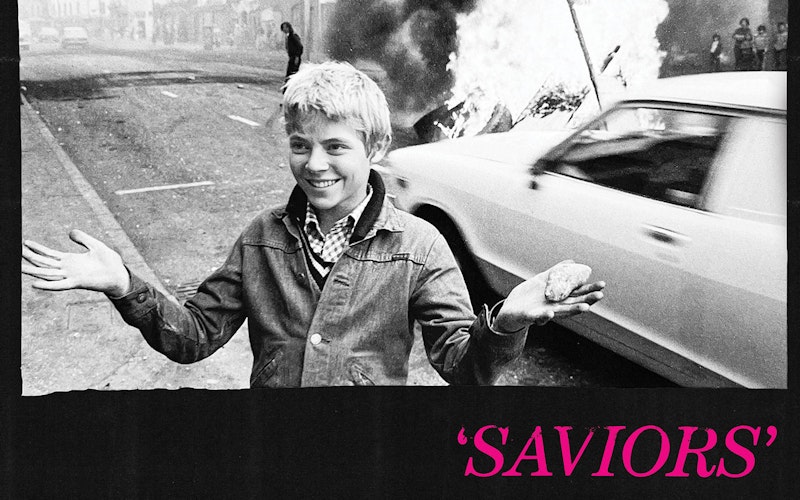
Music
Green Day's Search for Saviors
The late Mary Oliver penned quietly resolute poems about nature’s wonders and the American condition. Looking around in 2008, she described the culture’s collective heart as “small, and hard, and full of meanness.” Green Day leader Billie Joe Armstrong rehearses a louder language, somewhere between poetry and prophecy, on the band’s 2024 album Saviors, but their conclusions aren’t so far apart.
“People on the street / Unemployed and obsolete / Did you ever learn to read the ransom note?” he sings on the opening track, “The American Dream is Killing Me.”
Saviors quite nimbly sums Green Day’s career and concerns so far. The album owes and repays many musical debts, affectionately pilfering the Celtic bounce of The Pogues and relying on Abbey Road string sections. Like rock heroes The Clash, Green Day threads a needle with its serrated guitars and sticky-sweet melodies. And Armstrong sprinkles winking references to Sam Cooke and Nirvana across these stanzas.
Lyrically, these 15 songs remind us that Armstrong and company have been deciphering the same ransom note for more than 30 years. Garish, cut-and-paste letters tell Green Day that the American dream is hostage to the smaller, harder, meaner forces of our day—perhaps to the very nature of American dreaming itself.
Green Day diagnoses our particular ills early and often, singing of economic and emotional displacement, conspiracy-theory gospels, and know-nothing philosophies on the opener and on “Look Ma, No Brains!” They address police violence on “Coma City” and mass shootings on “Living in the ’20s.” The music gives voice to what many feel as a silent but ever-present distress.
Green Day diagnoses our particular ills early and often.
Approaching Saviors, it’s crucial to read the title as the band intends. Green Day never once poses as the answer to Christian prayers for a deliverer or as the band to initiate a redemptive movement. Rather, they try on an array of possible saviors like suits of armor, checking for dings and soft spots. Perhaps we might come home to ourselves, they suggest, by bottling the charge of young romance (“Bobby Sox,” “Suzie Chapstick”). Perhaps we should sink into the baptismal waters of nostalgia. (“She’s gonna bang her head like 1981,” Armstrong sings in a song named for that year.) Or maybe we should embrace the salvific powers of rock and roll (“Corvette Summer”).
Saviors’ most electric offering proposes vendetta and revenge as means to reclaiming our personal power. Somehow the band strikes righteous, boot-quaking fear through the simple chorus “Bada bing / Bada boom” on “One Eyed Bastard.” But even the song’s title confesses that although “an eye for an eye” might be canon, it isn’t sustainable in a world where “turn the other cheek” is rarely tried. If smash-and-grab action is all it takes to make things right, the songs and Scripture could stop there. But just as “an eye for an eye” leads to blurred vision, the Sermon on the Mount and 11 more album tracks exist, gesturing toward a gentler, much stranger way.
Green Day seems to know that revenge and utopian thinking, even the pull of a lover’s arms, represent the solutions of a stripped moral imagination, addressing same-old questions with same-old answers. The band comes closest to something original, something lasting, when its songs grow most tender. Softness isn’t a liability, but nudges us nearer to salvation.
“Goodnight Adeline” and “Father to a Son” form kind addresses to loved ones who watch their elders while waiting for something better. Passing empathy like a torch, huddling close to the people who matter, we might start quieter, longer revolutions. “You’re a lighthouse in a storm / From the day that you were born,” Armstrong sings to his boys on the latter cut.
The closing track, “Fancy Sauce,” sounds softer chords of an earlier Green Day anthem, 1994’s “Basket Case,” as Armstrong writes of mental hospitals and self-medication. His charged poetry offers little hope, instead something like an Ecclesiastical resignation to death. But the song’s very aesthetic underlines the need to hear each other out, in our hurts, at our most downhearted.
Green Day—like Mary Oliver—acknowledges that smallness and meanness cannot be erased by further hardening our hearts. “Maybe our world will grow kinder eventually,” Oliver wrote. “Maybe the desire to make something beautiful is the piece of God that is inside each of us.” In their own loud, echoing way, Green Day agrees: tenderness points us beyond promises broken by the American dream, toward something ageless and more beautiful. Many possible saviors remain, the band suggests, but the greatest of these is love.
Topics: Music